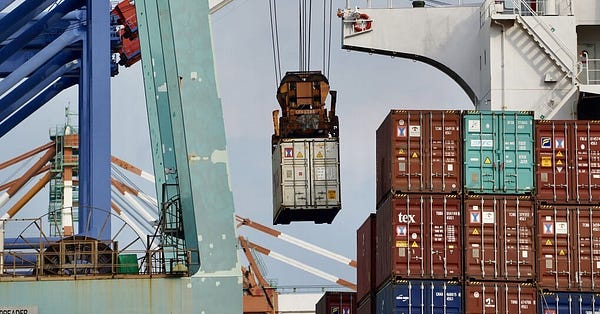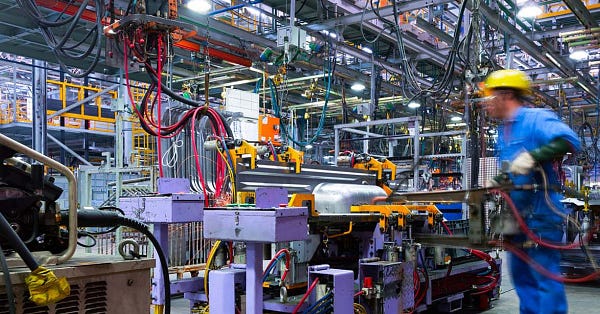Welcome to the 126th edition of Trade War. Today’s publication is outside the paywall with full content available to all readers. Enjoy!
To start, my personal reflections on Taiwan, China, and the Pelosi visit.
Next, is a slow-motion decoupling happening between China and the world? I think so and tell you why in my latest commentary.
And on to the news: Foxconn expands production to India and China makes business more difficult for Taiwanese companies. And a new site worth checking out is tracking the unfolding Fourth Taiwan Strait Crisis.
Beijing announces eight retaliatory countermeasures against Washington. Xi pushes his all-encompassing concept of national security. And Mars Wrigley, the maker of the Snickers candy bar, is the latest company to apologize to China over Taiwan.
‘Knows what he is talking about’
First, I am delighted to share this very generous shout-out from one of the writers I most respect, and whose substack (on China, U.S. politics, beer, aviation, & books) I strongly recommend reading, if you aren’t already.
“Dexter Roberts knows what he is talking about—when it comes to China, the US, and other cultures and economies affected by them both. I always read what he writes,” says James Fallows, author of Breaking the News
Thank you Jim, for the very kind words!
Some personal thoughts on Taiwan
I have very positive feelings for Taiwan, I place where I moved 10 days after graduating from college. Americans studying Chinese in school in the ‘80s, as often continued their studies in Taipei or Taichung, as in Beijing or Shanghai.
My time in Taiwan extended beyond the usual six months or one year of studies and I ended up living in Taipei for four years; at one point I fantasized about staying much longer, moving to the rugged east coast of Taiwan, and living as a part time recluse writer in the mountains.
That didn’t happen but as I still like to half joke – I spent the best years of my life in Taiwan - or at least some key years in my 20s. In the couple decades I later spent in China as a reporter I relished the trips back to Taiwan where officials not only would speak to you..
But in Taipei they usually welcomed your interviews - needless to say, a positive contrast with Beijing where it you were sometimes treated with suspicion or simply faced officials who weren't willing to talk (there were many positive exceptions, I should say)
When a Taiwan publisher was kind enough to publish the Chinese edition of my book “The Myth of Chinese Capitalism” last year, I also had the chance to reconnect with Taiwanese friends and make new ones.
All this is a way of saying that I somehow feel the present crisis a lot, even living far from Asia today and obviously being an outsider to the region.
I also must say that the rush of China analysts and scholars, many of them friends, who are so sure that Pelosi’s visit is a serious mistake, and so certain of that without apparently thinking much about what Taiwanese people feel might feel about her visit, seems really off.
I wonder what makes all of them sure they know better than many Taiwanese what is best for them? I’m not saying all Taiwanese support a visit by any means, just that clearly a not insignificant number seem to welcome Pelosi’s decision to come.
This attitude reminds me of one I’ve noticed amongst another group of people here in the US, sure they know what is best for China, sure it isn’t possible that some Chinese actually support the CCP, and have all this certainty without bothering to ask Chinese people themselves.
Those now calling the Pelosi visit a provocative mistake are not only parroting Beijing, whether they like it or not, but seem to be making the same mistake common to many China hawks.
They are deciding they know what is best for the Taiwanese or Chinese people, regardless of what the Taiwanese or Chinese might actually think. Anyway, just some thoughts as I watch what is happening in Taiwan, a place I care about and once called home.
Slow motion decoupling
“In a week where the visit by House Speaker Nancy Pelosi to Taiwan — and China’s angry response, including military drills — overshadows everything in the already tense U.S.-China relationship, talk of economic decoupling might seem like a sideshow.”
“But the reality is that Beijing and Washington will move past this fraught moment without war. So let’s temporarily set aside the obvious hostilities on display, and take a look at what has been happening in the business and investment relationship over just the last few days,” I write in a new commentary in SupChina.
What I see is not pretty and indeed looks like more of the slow motion decoupling between China and the West that has been ongoing for some time now.
Exhibit number one: The decision by Jeep - one of the first auto companies to set up a joint venture in China - to close its one remaining factory in China, citing government meddling.
And there is no doubt that the way China is treating Taiwan right now will cause even more global companies to consider looking elsewhere with new investment, rather than continue to put all (or most) of their business in the mainland basket.
And the larger picture for multinationals in China is not looking good. Overall, foreign-invested business’ profits fell by almost 14 percent so far this year, statistics released by the National Bureau of Statistics last week show. (China’s state enterprises, by contrast, experienced about a 10 percent jump in profits, while private firms saw a 3.3 percent drop.)


Foxconn moves more production to India
Apple supplier Foxconn is expanding iPhone production in India, further diversifying out of China, reports the South China Morning Post’s Coco Feng
Taiwan’s Foxconn, the world’s largest electronics contract manufacturer, is about to start producing more iPhones, opening new production lines at an existing facility in Chennai, according to Indian newspaper The Economic Times.
“In recent years, Apple and Foxconn have stepped up efforts to expand their supply chains outside mainland China, especially in India and Vietnam, which incentivize local production. Supply chains have faced a turbulent couple years amid disruptions from the Covid-19 pandemic and geopolitical conflicts,” writes Feng.
Now amidst the dramatic surge in Taiwan Strait tensions, there is likely to be more pressure on the island’s big companies to diversify beyond China, which has long been a key market and manufacturing platform for them.
Last year, Vietnam gave the green light for Foxconn’s planned $270 million plant producing laptops and tablets. Foxconn said it had invested $1.5 billion in Vietnam by the end of 2020, with another $700 million planned in 2021.


Pressure exerted on Taiwanese companies
Multiple Taiwanese companies have been ordered to follow Beijing’s rules on labeling for products imported to China, or face possible seizure by custom’s agents, reports Taiwan’s Central News Agency.
The decree follows shortly after China banned products from one hundred Taiwanese food manufacturers as well as stopped the exporting of natural sand to Taiwan.
In what appears to be part of Beijing’s efforts to punish Taiwan following Pelosi’s visit, companies were warned by trading companies and freight forwarders that any products bound for China should not be labeled as from "Taiwan," "Republic of China,” or “ROC,” Taiwan's Ministry of Economic Affairs said in statement Friday night. That requirement conflicts with Taiwan’s own regulations for labeling exports.
Meanwhile, Nikkei Asia reported that products of Pegatron Corp., second in size only to Foxconn in electronics contract manufacturing, were held by China’s customs to see if they met labeling rules. The move against Pegatron came just after a senior company official attended a lunch by Taiwan president Tsai Ing-wen, welcoming the U.S. House Speaker.
Still, Beijing is unlikely to strictly enforce the rules for all products originating from Taiwan: China is too reliant on electronics components from the island to be ready to really play hardball, says Darson Chiu, an economist with the Taiwan Institute of Economic Research. And with the U.S. extending rules barring tech products from being sold to China, the reliance on Taiwan is likely to only grow.


‘Taiwan’s greatest economic boom’
“There is now talk of China ratcheting up economic pressure on Taiwan. No doubt it will try. But that has also been China's policy throughout Tsai Ing-wen's presidency... which happens to have coincided with Taiwan's greatest economic boom since its "Asian Tiger" years,” tweets The Economist’s Simon Rabinovitch.
“And to head off some silliness, I'm not attributing Taiwan's recent good run to Tsai alone. Ultra-strong semiconductor demand plus some reshoring from China are the principal drivers. But Taiwan's good fortune does show the limits of China's pressure campaign thus far.”


Eight countermeasures
China has announced eight countermeasures against the U.S. in response to Pelosi's Taiwan visit.
1. Canceling China-US Theater Commanders Talk.
2. Canceling China-US Defense Policy Coordination Talks (DPCT).
3. Canceling China-US Military Maritime Consultative Agreement (MMCA) meetings.
4. Suspending China-US cooperation on the repatriation of illegal immigrants.
5. Suspending China-US cooperation on legal assistance in criminal matters.
6. Suspending China-US cooperation against transnational crimes.
7. Suspending China-US counternarcotics cooperation.
8. Suspending China-US talks on climate change.



PRC ‘punishing the entire world’
“[U.S. Special Envoy] John Kerry is right. By suspending talks with the U.S. on Climate Change, the PRC is punishing the entire world, especially developing countries. Beijing should reconsider,” tweets U.S. Ambassador to China Nicholas Burns.

Pelosi: ‘They are not doing our travel schedule’
China “will not isolate Taiwan by preventing us to travel there . . . We will not allow them to isolate Taiwan. They are not doing our travel schedule,” says House Speaker Nancy Pelosi, speaking while in Tokyo following her visit to Taiwan.

Tracking the Fourth Taiwan Strait Crisis
Washington DC-based think tank CSIS has launched a page to track China's actions as they develop during what they are calling the Fourth Taiwan Strait Crisis.
“China [has] responded with forceful and coercive military, economic, and diplomatic measures. Developments are still unfolding, but the large-scale and unprecedented military exercises taken by the Chinese People’s Liberation Army (PLA) far exceed the operations China engaged in during the Third Taiwan Strait Crisis that took place in 1995-1996.”


Xi’s China ‘beset by malevolent forces’
Seeing threats to China’s future as originating from outside and within, over the last decade Xi Jinping has pushed an all-encompassing view of national security and built a formidable structure to match it, one reaching deep into state and society, report the New York Times’ Chris Buckley and Steven Lee Myers.
“He has strengthened, centralized and emboldened an already pervasive security apparatus, turning it into a hulking fortress that protects him and positions him as the most powerful leader since Mao Zedong and Deng Xiaoping. Mr. Xi has built what he calls a “comprehensive” system designed for a world he sees as determined to thwart China — politically, economically, socially, militarily and technologically,” write Buckley and Myers.
Xi has long believed “China is beset by malevolent forces and internally prey to centrifugal forces,” says Daniel R. Russel, a former senior American diplomat now a vice president at the Asia Society Policy Institute.
Just one year after becoming top leader, Xi announced plans to establish a National Security Commission and shortly afterward presided over its creation. Today, “the commission is one of the most secretive bodies of a secretive state. Its size, staffing and powers remain unclear. Its officials rarely meet foreigners,” reports the Times.
“The national commission established local security committees across provinces, cities and counties. These local committees focus on domestic threats like protests and dissent. They often remind cadres that crisis or insurrection are not remote threats; they could break out on their doorstep.”
“It legitimizes . . . a stronger coercive dimension in nearly every area of government,” says National Defense University senior research fellow Joel Wuthnow.


Snickers: Taiwan an ‘inseparable part of Chinese territory’
Mars Wrigley, the maker of the Snickers candy bar, is the latest company to apologize to China, report the Wall Street Journal’s Shen Lu and Ginger Adams Otis.
In a Snickers promotional video featuring an online event with South Korean boy band BTS, the American candy-maker showed the flag of Taiwan and seemed to suggest Taiwan was a country, both anathema to China’s leaders and nationalists.
After being shared on China’s Weibo social media site, thousands of Chinese internet users attacked the American candy brand and threatened a boycott of its products.
After taking down the video, the company apologized: “We are aware of the report about Snickers’ activities in some regions in Asia, and we take it very seriously and apologize for it,” Mars Wrigley said in its first apology.
In another apology only two and a half hours later, the company added: “There is #OnlyOneChina in the world, and Taiwan is an inseparable part of Chinese territory.”


Notable/In depth
“Sectors targeted and subsidized through China’s Five-Year Plans experience a surge in new firms, while the corresponding sectors in the U.S. see declines in firm births, output, employment, and earnings,” notes this report (pdf) by the Stanford Center on China’s Economy & Institutions.
“Early FYPs (i.e., the 10th and 11th plans covering 2001 to 2010) tended to displace production in labor-intensive industries in the U.S. such as consumer electronics, textiles, and furniture manufacturing. However, the more recent FYPs (i.e., the 12th and 13th plans covering 2011 through 2020) squeezed higher capital-intensive industries like telecommunications and clean energy.”


“Still unclear is whether the United States and other countries can muster the political foresight and regulatory wherewithal to turn China’s brain surplus to their advantage, perhaps modifying asylum rules to lure China’s best and brightest into relocating permanently to the West,” writes Foundation for Defense of Democracies’ senior China fellow Craig Singleton in Foreign Policy.
“During World War II and the Cold War era, similar programs weakened the West’s adversaries by attracting top minds seeking refuge from Nazi and Soviet oppression, although new programs and vetting procedures would need to be adapted to account for the long arm of China’s espionage apparatus.”


“These four wise men and women feel that Pelosi's trip to Taiwan was 'reckless'. A sobering listen. Not because they are right but because this podcast, reflecting what I take to be a strand of mainstream Democrat thinking, does everything Taiwan twitter has been worried about,” tweets American lawyer and long time Taipei resident Michael Fahey.
“1. They primarily see the visit through the prism of U.S.-China relations. 2. There is no discussion or consideration of Taiwan's interests or agency. None. 3. Highly U.S.-centric point of view 4. Kissinger-like geostrategic realism...”


Here is Nancy Pelosi writing in 1992 to then president of Taiwan Lee Teng-hui about human rights abuses in Taiwan.
(Those calling Pelosi’s recent Taiwan visit only about winning political points at home might be interested in this letter showing concern about human rights - and Taiwan - from three decades ago.)
Montana picture
A curious fawn watches a passerby on a summer afternoon.





